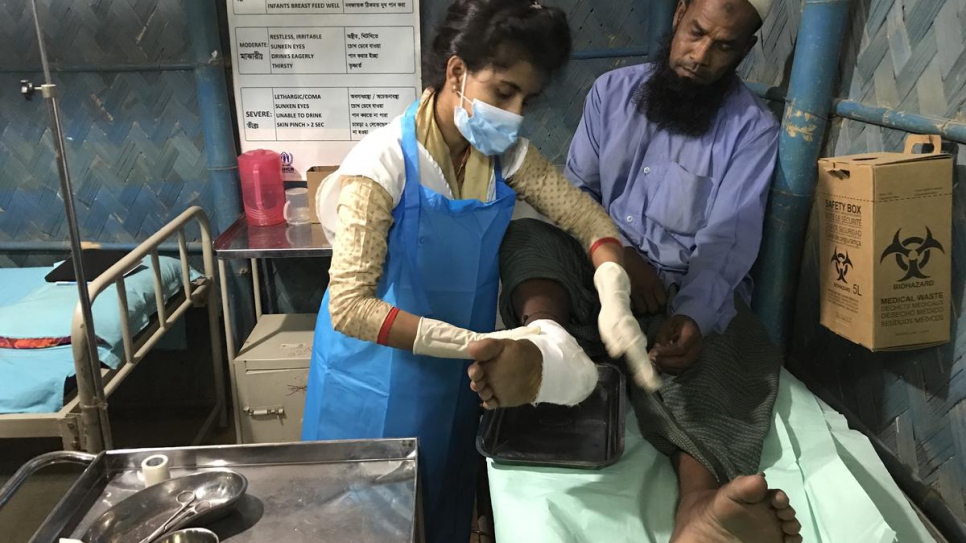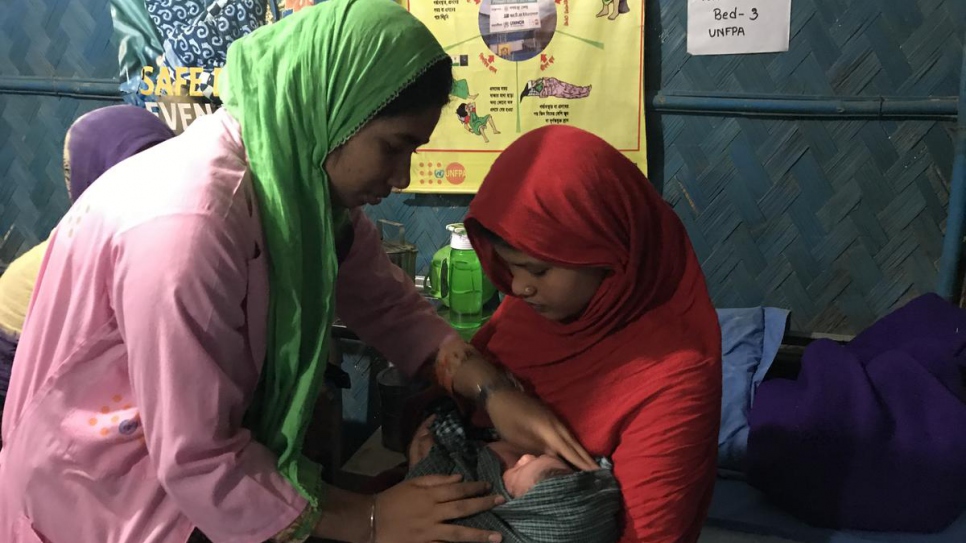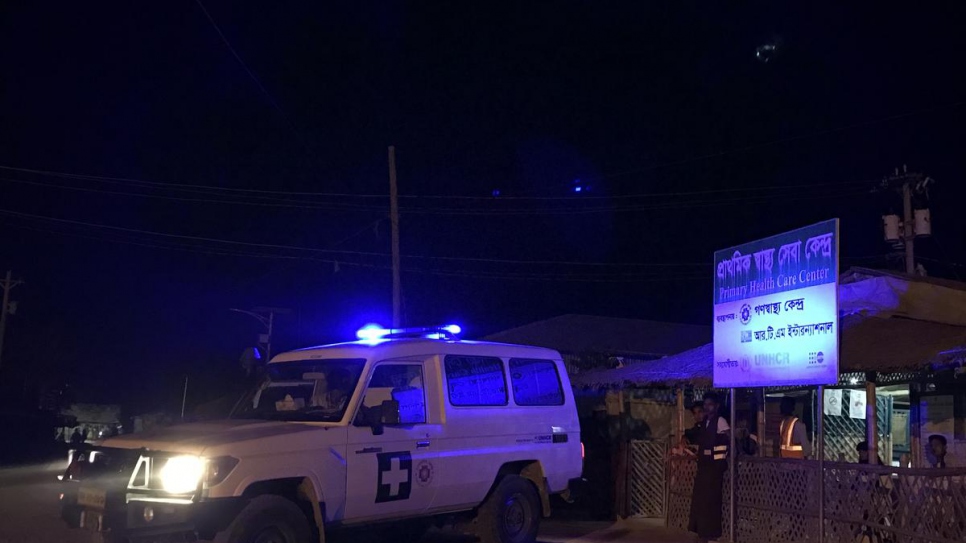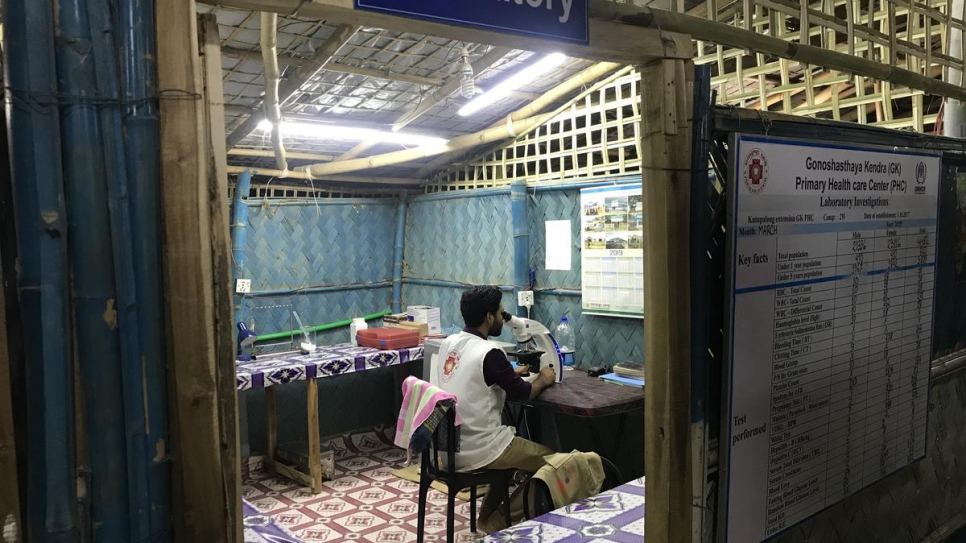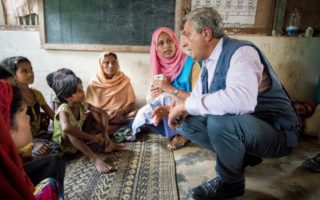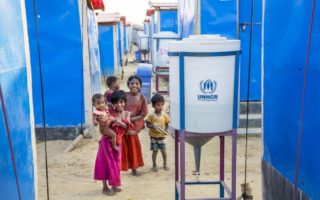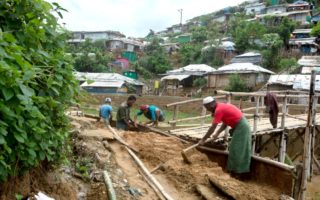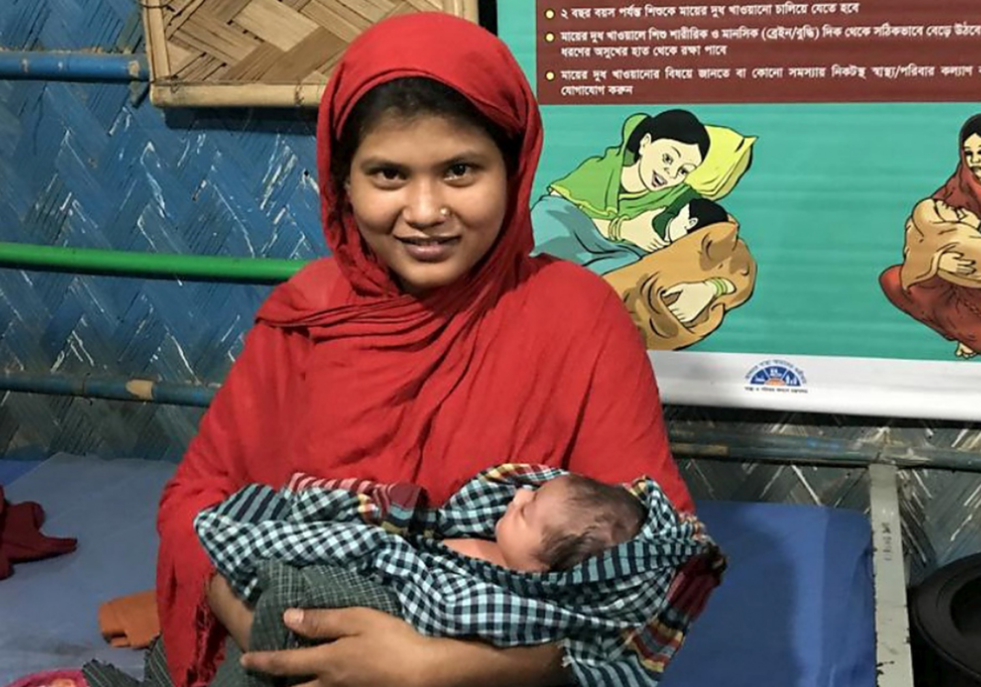
Rohingya refugee Rajuma cradles her newborn daughter at a 24-hour primary healthcare centre in Kutupalong, Bangladesh. © UNHCR/Iffath Yeasmine
UNHCR and its partners provide round-the-clock emergency health care for Rohingya refugees in south-eastern Bangladesh.
By Iffath Yeasmine in Kutupalong refugee settlement, Bangladesh
In a plastic-roofed shack at the world’s largest refugee settlement, Rajuma went into labour. At around 11 at night her pain became too much to bear — but fortunately help was at hand.
Her husband Mohammed Aiyub rushed her through the maze of alleyways to a 24-hour primary care centre near Kutupalong, in south-east Bangladesh, where doctors and nursing staff gave her the care and confidence that she needed to manage a complicated delivery.
“I was in pain but I didn’t feel scared because I saw all the machines, and the doctors and midwives seemed very well trained,” says Rajuma, cradling her daughter, who was born at seven the following morning. The 18-year-old is tired but happy.
The 10-bed centre where she is a patient is supported by UNHCR, the UN Refugee Agency and the UN Population Fund. It is run by local partners, Research, Training and Management International, or RTMI, and Gonoshasthaya Kendra, or GK.
The clinic is one of nine primary health centres supported by UNHCR that are now open 24 hours a day, seven days a week, providing life-saving services to Rohingya refugees like Rajuma. A further 14 health posts provide daytime services and referral to the clinics.
“I was in pain but I didn’t feel scared because I saw all the machines.”
They serve nearly one million Rohingya refugees who live in the vast, pop-up settlements, more than 740,000 of whom fled a government crackdown in Myanmar in 2017 that followed decades of marginalization and abuse for the stateless Muslim minority.
Rajuma said that, as a Rohingya, it was very difficult to access public health facilities at home in Myanmar. Due to their ethnicity, she says they were often asked for bribes or extra fees for treatment in public clinics or hospitals, which her family could not afford.
“One of my friends died while giving birth to her first child in Myanmar,” she recalls. “She did not have access to the public clinic. The traditional birth attendant who helped with the home delivery did not have medical training.”
Since the Rohingya refugee crisis began nearly two years ago, UNHCR, its NGO partners and other UN agencies have worked closely with the Bangladesh Ministry of Health and Family Welfare and local authorities to scale up their assistance to provide essential health care to refugees.
UNHCR supported primary health care facilities gave 482,000 consultations to refugees at the settlements in 2018, without charge. The agency and its partners have also trained 309 refugees as volunteer community health workers, who go house-to-house to increase awareness about health and nutrition issues.
The big breakthrough has been in expanding services to provide health care at night. It is assisted by a round-the-clock ambulance service — available through medical referrals — to transport critically ill refugees to hospital services outside the refugee settlements. Costs incurred in facilities outside of the camp are covered by UNHCR.
“These primary health care centres are the backbone of our health response,” says Oscar Sanchez Pineiro, Senior Field Technical Coordinator with UNHCR in Cox’s Bazar. “And the facilities that operate throughout the night provide a critical service to the refugees here in Kutupalong.
“There have been at least seven maternal deaths in the community due to labor complications. . . so these centres are really important to enable refugee women to deliver safely,” he adds.
Despite record levels of global displacement and continuing refugee influxes, some 10.5 million refugees worldwide were supported with public health services by UNHCR and partners last year, according to UNHCR’s Annual 2018 Public Health Global Review, released today.
Among progress noted in 2018, was a continuing decline worldwide in mortality rates among refugee children under the age of five, an important health impact indicator in emergencies.
The investment in health care provided by all the humanitarian agencies has an important impact in refugee settlements in southern Bangladesh, where the crude mortality rate – used to determine per capita death rates – decreased by a whopping 70 per cent in 2018 from the previous year.
“The facilities that operate throughout the night provide a critical service to refugees.”
“We have made huge inroads in providing health care to everyone who needs it – literally saving lives and making a difference every day,” says Sandra Harlass, UNHCR’s Senior Public Health Officer. “In Myanmar, most women delivered at home. Health centres were scarce; vaccination rates were extremely low and there were also high levels of acute malnutrition.
“There’s still work to be done, though, as only one third of the women deliver newborns in a health facility. We are working with refugees as partners. They participate as community outreach workers and join health committees. This helps us to understand refugee’s needs better and addressing them together. Changing health seeking behavior is a long process, but when refugees talk to refugees it becomes much easier,” she adds.
Back at the health centre in Kutupalong, Rajuma and her newborn daughter settle down for a second night at the clinic, watched on by nurse Sarmin Aktar Sathi.
“A number of patients are still carrying the scars of the violence in Myanmar,” she says. “Serving in this health centre is more than just a job to me. Emergency cases cannot wait for the sun to rise, so night clinics are a saviour for them.”
For her part, Rajuma is grateful for the care she received. “I think that I am blessed to receive the care and affection I get here. Coming to Bangladesh, we have witnessed a great change in our lives. Now, I think: no mother needs to die; no baby needs to die.”
Originally published by UNHCR on 18 July 2019



